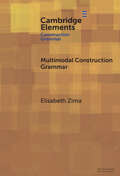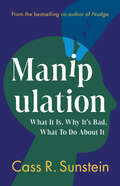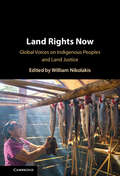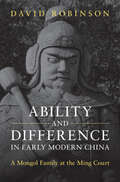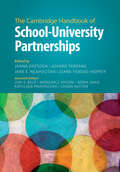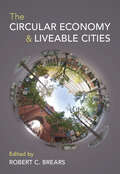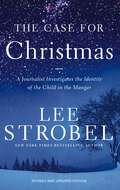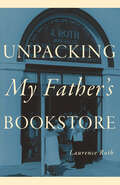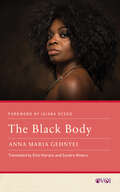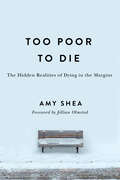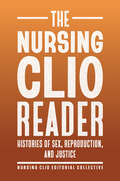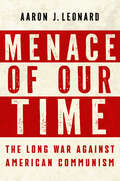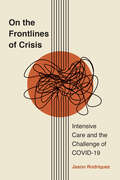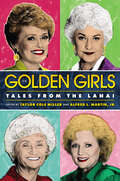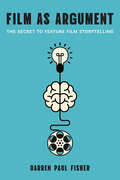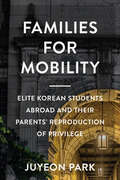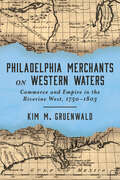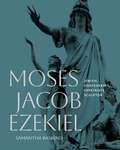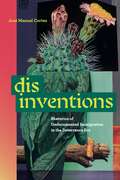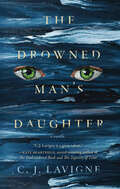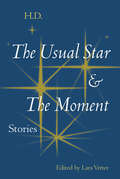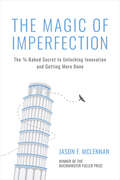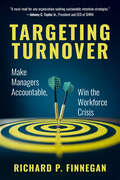- Table View
- List View
Multimodal Construction Grammar (Elements in Construction Grammar)
by Elisabeth ZimaThis Element in Construction Grammar addresses one of its hottest topics and asks: is the unimodal conception of Construction Grammar as a model of linguistic knowledge at odds with the usage-based thesis and the multimodality of language use? Are constructions verbal, i.e. unimodal form-meaning pairings, or are they, or at least are some of them, multimodal in nature? And, more fundamentally, how do we know? These questions have been debated quite controversially over the past few years. This Element presents the current state of research within the field, paying special attention to the arguments that are put forward in favour and against the uni-/multimodal nature of constructions and the various case studies that have been conducted. Although significant progress has been made over the years, the debate points towards a need for a diversification of the questions asked, the data studied, and the methods used to analyse these data.
Manipulation: What It Is, Why It's Bad, What to Do About It
by Cass R. SunsteinNew technologies are offering companies, politicians, and others unprecedented opportunity to manipulate us. Sometimes we are given the illusion of power - of freedom - through choice, yet the game is rigged, pushing us in specific directions that lead to less wealth, worse health, and weaker democracy. In, Manipulation, nudge theory pioneer and New York Times bestselling author, Cass Sunstein, offers a new definition of manipulation for the digital age, explains why it is wrong; and shows what we can do about it. He reveals how manipulation compromises freedom and personal agency, while threatening to reduce our well-being; he explains the difference between manipulation and unobjectionable forms of influence, including 'nudges'; and he lifts the lid on online manipulation and manipulation by artificial intelligence, algorithms, and generative AI, as well as threats posed by deepfakes, social media, and 'dark patterns,' which can trick people into giving up time and money. Drawing on decades of groundbreaking research in behavioral science, this landmark book outlines steps we can take to counteract manipulation in our daily lives and offers guidance to protect consumers, investors, and workers.
Land Rights Now: Global Voices on Indigenous Peoples and Land Justice
by William NikolakisLand rights for Indigenous Peoples are a global phenomenon and have become an important part of the liberal democratic state. But despite the promise of restoring land rights to Indigenous Peoples, most land justice frameworks have preserved the status quo in what is a slow and arduous process. In this work, William Nikolakis draws from the diverse experiences of Indigenous and non-Indigenous scholars and legal practitioners across the world to document both persistent barriers to 'Land Back' as well as opportunities to move forward for land justice. By bringing these voices together, Nikolakis seeks to share lessons from the land justice movement with the goal of advancing land rights for Indigenous Peoples across the world. This title is also available as open access on Cambridge Core.
Ability and Difference in Early Modern China: A Mongol Family at the Ming Court
by David RobinsonIn 1405, a family left their home in the Mongolian steppe and moved to China. This daring decision, taken at a time of dramatic change in eastern Eurasia, paved the way for 250 years of unlikely success at the Ming court. Winning recognition for military skill and loyalty, the family later known as the Wu gained a coveted title of nobility and became members of the capital elite until the dynasty's collapse in 1644. By tracing the individual fortunes of a single family, David Robinson offers a fresh and accessible perspective on the inner workings of Ming bureaucracy. He explores how the early-modern world's most developed state sought to balance the often contradictory demands of securing ability and addressing difference, a challenge common to nearly all polities.
The Cambridge Handbook of School–University Partnerships (Cambridge Handbooks in Education)
by Diane Yendol-Hoppey Logan Rutten JoAnne Ferrara Janna Dresden Jane E. Neapolitan Jori Beck Morgan Faison Sofia Janis Kathleen ProvinzanoThe Cambridge Handbook of School-University Partnerships offers a panoramic view of research on school-university partnerships (SUPs), laying the groundwork for further development in the field. Through different theoretical and methodological perspectives, it amplifies the voices of scholars and practitioners across various institutions. This inclusive approach provides a comprehensive resource for researchers, scholars, students, practitioners, and policymakers, that honors diversity while fostering unity and expansion within the field of SUPs. Covering topics from historical foundations to international perspectives, the handbook delves into areas such as teaching, equity, leadership, community engagement, innovation, funding, and policy. By embracing the collaborative essence of SUPs, it promotes mutual benefit and encourages continued exploration in these dynamic settings.
The Circular Economy and Liveable Cities
by Robert C. BrearsA practical and interdisciplinary guide to creating liveable, circular economy cities. Practical strategies enhance the book's theoretical exploration of circular economies, providing a solution-oriented perspective on creating more resilient, environmentally sustainable and liveable cities. The chapter authors offer interdisciplinary perspectives on the transformative potential of circular economies when incorporating ecological and social aspects with innovative technologies. The topics covered range from sustainable agriculture and water management to renewable energy and environmental justice. Case studies of cities from around the world promote effective best practices in circular economy implementations across diverse cities, including Tokyo, Singapore, New York, Vancouver, Sydney, the Hague, Barcelona, and Stockholm. This book introduces and discusses the 5R framework - Reduce, Reuse, Recycle, Restore, Recover - as a guiding principle, elaborating its applications across various urban sectors. This book is indispensable for advanced students, researchers, city planners, and policymakers working in urban planning and sustainable development.
The Case for Christmas: A Journalist Investigates the Identity of the Child in the Manger
by Lee StrobelWho was in the manger that first Christmas morning? And how can we know for sure?In this completely revised and updated edition of The Case for Christmas--reflecting the latest scholarship and research--award-winning legal journalist Lee Strobel weighs the evidence to distinguish myth from truth about what happened in Bethlehem.What can we know about the events of Christmas morning? And, most importantly, who was born that day? Some say the newborn baby would become a great moral leader. Others, a social critic. Still others view Jesus as a profound philosopher, a rabbi, a feminist, a prophet, and more. Many are convinced he was the divine Son of God. But who was he really--and how can we know for sure?Evaluating and organizing the biblical, historical, and textual evidence, Strobel searches out the true identity of the child in the manger, analyzing:The latest, most up-to-date scholarship and researchThe historical reliability of the accounts of Jesus's birthThe evidence for the virgin birthThe array of Old Testament prophecies fulfilled by the birth of JesusThe most common questions about the story of Christmas Join Strobel as he invites us to push past the distractions of the holiday season and come into the presence of the baby who was born to change us and rewrite our eternal destination: the greatest gift of all.
Unpacking My Father's Bookstore
by Laurence RothUnpacking My Father’s Bookstore brings to life the history of J. Roth / Bookseller of Fine & Scholarly Judaica, which was a microcosm of the Los Angeles Jewish community from 1966 to 1994 and one of the premier Jewish bookstores in the United States. Blending critical analysis with a personal account of growing up in his father’s bookstore, and connecting both to larger forces that helped shape Jewish and American book retailing in the twentieth-century, Laurence Roth crafts a richly felt narrative about his family’s Jewish experience in America. It is a reminder, too, that while most independent bookstores like J. Roth Bookseller disappear from history, these retailers often had outsized effects on their communities. Breaking with conventional modes of scholarship, Unpacking My Father’s Bookstore tells a unique and troubled story that rarely gets told, one that is both personal and analytical, theoretical but rooted in the everyday.
The Black Body (Other Voices of Italy)
by Anna Maria GehnyeiIn her memoir, Anna Maria Gehnyei, better known as singer, rapper, and producer Karima 2G, reveals the challenges she faced as the child of Liberian immigrants, born and raised in Rome but perpetually viewed by her fellow Italians as a foreigner. The daughter of the first Kpelle man to ever leave his native village and emigrate to Europe, Anna is proud of her heritage but only knows Liberia as a mystical, faraway land that appears in her parents’ stories. Though Italy is the only homeland she knows, she is merely classed as a resident, not a permanent citizen. At school and in the streets of Rome, she is treated to a mixture of patronizing condescension and xenophobic hostility. But Anna refuses to be bullied into mute submission, finding her voice as a performer and activist who demands recognition for Italy’s growing immigrant population.
Too Poor to Die: The Hidden Realities of Dying in the Margins
by Amy SheaDeath is the great equalizer, but not all deaths are created equal. In recent years, there has been an increased interest and advocacy concerning end-of-life and after-death care. An increasing number of individuals and organizations from health care to the funeral and death care industries are working to promote and encourage people to consider their end-of-life wishes. Yet, there are limits to who these efforts reach and who can access such resources. These conversations come from a place of good intentions, but also from a place of privilege. Too Poor to Die: The Hidden Realities of Dying in the Margins, a collection of closely connected essays, takes the reader on a journey into what happens to those who die while experiencing homelessness or who end up indigent or unclaimed at the end of life. Too Poor to Die bears witness to the disparities in death and dying faced by some of society’s most vulnerable and marginalized and asks the reader to consider their own end-of-life and disposition plans within the larger context of how privilege and access plays a role in what we want versus what we get in death.
The Nursing Clio Reader: Histories of Sex, Reproduction, and Justice (Critical Issues in Health and Medicine)
by Judith Walzer Leavitt Susan M. Reverby Janet Golden Kylie Smith Karen Weingarten Elizabeth Zeman Kolkovich Katrina Kimport Cara Delay Maggie Vinter Lara Freidenfelds Shannon Withycombe Caitlin Reed Wiesner Kirsten Leng Elizabeth Reis Alicia Gutierrez-Romine Brianna Theobald Gillian Frank Nora Doyle Elizabeth Nelson Samantha M. Williams Ciara Breathnach W. Jake Newsome Joseph Gamble Sarah Mellors Rodriguez Averill Earls Elizabeth Garner Masarik Mary Fissell Ronit Stahl Jacqueline D. Antonovich Emily Beckman Cassandra Berman Scottie Hale Buehler John A. Carranza Sara Collini Kathleen Crowther Laura Ansley Catherine Denial Michelle Drew Lea Eisenstein Sarah E. Handley-Cousins Evan Elizabeth Hart Sharon Folkenroth Hess Rebecca M. Kluchin Modupe Labode Ian Lekus Amanda Mahoney Michelle Moravec Lina-Maria Murillo P. Mimi Bhatt Ayah Nuriddin Kelly S. O'Donnell Udodiri Okwandu Sarah Pripas-Kapit J. Nalubega Ross Nina Studer Sarah Swedberg Lauren MacIvor Thompson Stephanie Tillman Felicity M. Turner Theresa Ventura Anna Weerasinghe Cookie Woolner P. Mimi NilesOn June 24, 2022, the Supreme Court’s Dobbs v. Jackson Women’s Health Organization decision overturned Roe v. Wade, stripping federal protection for abortion rights and placing control in the hands of individual states. This monumental shift in policy underscores the need for deeper historical perspectives on reproductive rights. The Nursing Clio Reader answers that call, bringing together essays that examine reproductive health through historical research and personal experience. Featuring both new and classic pieces from the Nursing Clio blog, leading historians of reproductive health provide insights that connect past struggles with today’s ongoing battles over bodies, reproductive rights, and health care. This collection offers intimate, urgent scholarship that speaks to the present moment. A powerful resource for classrooms and individual readers alike, The Nursing Clio Reader invites reflection on how the past informs current debates, urging us to engage deeply with the history of reproductive justice in a time of unprecedented change, underscoring that indeed "the personal is historical."
Menace of Our Time: The Long War Against American Communism
by Aaron J. LeonardBeginning at the turn of the century, and ending only with communism’s collapse, the US government and major elements in the wider society undertook an unrelenting effort to suppress and criminalize domestic communism. This book tracks those efforts; from the state laws of the twenties that imprisoned the fledgling communist leadership, the efforts by police and local authorities against communists as they fought for unions, racial equality, and the unemployed, the trials and imprisonment of communist leaders mid-century, the extra-legal efforts of the Counterintelligence Program (COINTELPRO) in the sixties, and the ongoing, relentless attention by the FBI afterward. This is a long-overdue book about the most extensive, repressive effort ever undertaken by US authorities against a political organization that, however problematic, was largely operating within the scope of constitutionally mandated freedoms.
On the Frontlines of Crisis: Intensive Care and the Challenge of COVID-19 (Critical Issues in Health and Medicine)
by Jason RodriquezOn the Frontlines of Crisis is a powerful account of the experiences of healthcare workers during the COVID-19 pandemic. As hospitals worldwide became overwhelmed by an influx of critically ill patients, those working in intensive care units (ICUs) were thrust into an unprecedented battle against a deadly virus about which little was understood. Rodriquez takes readers into the heart of two Massachusetts ICUs to learn about the people who put their lives on the line and faced severe challenges as they treated critically ill patients at the peak of the pandemic. A dramatic spike in mental health distress among these healthcare workers was a consequence of the pandemic, but was also a result of the changing dynamics within the healthcare system itself. Here, Rodriquez examines the impact of the development of the contemporary focus on “clinical empathy.” This clinical method, while intended to improve patient care, had profound implications for healthcare workers during the pandemic, often blurring the lines between professional distance and personal involvement, increasing the emotional demands on staff and heightened their vulnerability to anxiety, depression, post-traumatic stress, and burnout. Through the personal stories of those who were in the ICU, On the Frontlines of Crisis offers a sobering reflection on the social and emotional costs of caring for patients.
The Golden Girls: Tales from the Lanai
by Ken Feil Ben Aslinger Peter C. Kunze Alfred L. Martin Jr. Kate Fortmueller Taylor Cole Miller Jessica Hoover Andrew Owens Claire Sewell Beth L Boser Jared Clayton Brown Ashleé Clark Eleanor Patterson Jr.The Golden Girls: Tales from the Lanai is an accessible collection that explores the cultural, industrial, and historical impact of that beloved American sitcom. Edited by Taylor Cole Miller and Alfred L. Martin, Jr., this anthology brings together a diverse range of voices that model different media studies approaches to researching and critically analyzing television texts. The Golden Girls reclaims the production history and development of the show, opens new conversations about audiences–especially Black, queer, and female audiences–and provides new insight into the meteoric rise in popularity of The Golden Girls as a 2020s cultural phenomenon. With twelve original chapters and extensive original interviews offering readers rare insights behind the scenes, the book is a long day’s journey into the marinara of The Golden Girls–an immersive, engaging opportunity for readers to learn more about the show. It truly is the golden age of The Golden Girls.
Film as Argument: The Secret to Feature Film Storytelling
by Darren Paul FisherIf you’ve picked up this book, it’s most likely that you have an interest in movies over-and-above the typical audience member. Perhaps a screenwriter, producer or director looking to improve your work, always searching for any insight that will result in better cinematic storytelling. If that’s the case, then good news: this is the book for you. It asks a deceptively straightforward question. Why do we make feature films? Is it to entertain? To move and audience? To tell a powerful story? For fame and fortune? You may have answered yes to each, but those answers don’t account for the practice overall. Most books about screenwriting and directing are primarily concerned with craft and technique, but how can you truly understand filmmaking – or make the best films - unless you know what purpose it really serves. So what’s the secret? As the title of this book suggests, making feature films is fundamentally the practice of making a very specific type of argument. To see how this works, we will deep-dive into how filmmakers are trained and taught to think about filmmaking, and what traditions they knowingly or unknowingly follow. We will look at hundreds of films and some major case studies, including Toy Story 3, Schindler’s List, Raiders of the Lost Ark, Amour, and mother!, to explore how and what films argue, and why knowing this can both unlock both a greater appreciation of the form, and improve the impact your films make.
Families for Mobility: Elite Korean Students Abroad and Their Parents' Reproduction of Privilege (Families in Focus)
by Juyeon ParkFamilies for Mobility documents elite Korean transnational families, focusing on how they use elite education abroad as a tool for class reproduction. Drawing on over 100 interviews with both parents and children at elite U.S. colleges, the book explores the desires, aspirations, and expectations that shape these education-driven transnational family arrangements. By triangulating the perspectives of children, mothers, and fathers, Families for Mobility argues that gendered transnational parenting—by both mothers and fathers—plays a crucial role in the intergenerational transmission of mobility and cosmopolitan lifestyles. The analysis shows how class and gender shape both parents’ and children’s approaches to their transnational ‘family projects,’ with fathers and sons appearing more resourceful and ambitious than mothers and daughters, reflecting the gender achievement gap even among the elite. The book challenges stereotypes of Asian high achievers and ‘tiger’ parenting, providing a more nuanced understanding of who thrives in the hierarchical realms of global education and business, as well as the familial support systems behind their success.
Philadelphia Merchants on Western Waters: Commerce and Empire in the Riverine West, 1750–1803
by Kim M. GruenwaldHow Philadelphia merchants forged trade networks that fueled America's westward expansion.Why did the Midwest become part of the United States instead of remaining under English, Spanish, or Native control? In Philadelphia Merchants on Western Waters, historian Kim M. Gruenwald reveals commerce and trade, rather than war and political conflict, as the driving force behind America's westward expansion. Through meticulous research into business records, Gruenwald brings to life the daring ventures of Philadelphia merchant companies like Baynton, Wharton & Morgan, who sought to dominate the Illinois fur trade, and Reed & Forde, who expanded trade routes while speculating in land warrants. Their efforts laid the foundation for the Louisiana Purchase in 1803, which unified both banks of the Ohio and Mississippi Rivers under one nation and set the stage for America's continental empire. Studying international dealings with French, Spanish, and Native powers, as well as the complexities of river commerce, Gruenwald paints a vivid portrait of a transformative era between the colonial Atlantic world and America's westward push to the Pacific. Commercial expansion into what Gruenwald dubs "the Riverine West" represents a unique era in American history between the Atlantic of the colonial British Empire and the overland journeys of Americans heading across the Great Plains to California and Oregon in the nineteenth century. This book redefines our understanding of how a fledgling republic secured control of its western frontier—not through military conquest but through entrepreneurial spirit.
Moses Jacob Ezekiel: Jewish, Confederate, Expatriate Sculptor
by Samantha BaskindHow is it that the prolific nineteenth-century sculptor Moses Jacob Ezekiel is largely forgotten today? Ezekiel was the first renowned Jewish American artist and one of the most popular artist-celebrities of his day. In terms of drama, his life story rivals Alexander Hamilton’s. Ezekiel fought for the Confederacy at the Battle of New Market as a teenager and was friends with Robert E. Lee. After the war, he established himself as an artist in Rome, where he was honored by European royalty and enjoyed friendships with the likes of Franz Liszt, Queen Margherita, and Kaiser Wilhelm II. Ezekiel created well over one hundred sculptures, but his hotly contested Confederate works have since obscured his other major accomplishments.Drawing on a wealth of primary sources, Moses Jacob Ezekiel resurrects this complicated artist’s life and work and presents the fascinating details of how his sculptures were commissioned and made. Samantha Baskind shows how Ezekiel’s sculptures shed light on a range of issues, including the modernization of American Jewry, radical changes in the art world concerning style and patronage, and Civil War commemoration. The conflicting allegiances that motivated Ezekiel’s statues—his conservative Confederate leanings alongside his liberal views on peace, Judaism, and religious liberty—make him an intriguing lens through which to understand nineteenth-century transatlantic culture and history.This compelling book provides a complete picture of Ezekiel’s oeuvre and his renowned home studio, which drew international visitors. It will appeal to readers interested in art history, Jewish studies, Civil War studies, American studies, and public monuments.
Disinventions: Rhetorics of Undocumented Immigration in the Deterrence Era (RSA Series in Transdisciplinary Rhetoric)
by José Manuel CortezUS immigration policy along the southwestern border is deadly. Since 1994, the US Border Patrol has implemented a federal immigration strategy known as “prevention through deterrence,” which closed off many urban entry points along the US-Mexico border and militarized urban border crossings. This policy forced undocumented migrants to cross through dangerous terrain like the Sonoran Desert, often with tragic results. Immigrant advocates highlight migrant disappearances and deaths to expose the policy’s human toll. In Disinventions, José Manuel Cortez argues this approach is unlikely to bring an end to such oppressive immigration practices.Disinventions examines the cultural, political, and rhetorical effects of US deterrence practices, exploring how discourse on immigration overlooks subjects who have always been a part of the borderlands but are rarely included in migration narratives. He highlights the failings of decolonial methods and discourse to fully capture and represent marginalized voices, including Black, Central American, and queer subjects. And he develops an ethics of unconditional hospitality embracing undocumented migrants. By drawing on the concept of “atopias” and what he calls “sites of disinvention” to unearth new forms of politics, Cortez suggests we can transcend the limits of decolonization discourse and humanize undocumented immigrants. This challenging and engaging work should appeal to scholars and students of rhetorical studies, Latinx studies, and American studies.
Letters to Kafka: A Novel
by Christine EstimaA sweeping, tragic romance and feminist adventure about translator and resistance fighter Milena Jesenská’s torrid love affair with Franz Kafka. In 1919, Milena Jesenská, a clever and spirited twenty-three-year-old, is trapped in an unhappy marriage to literary critic Ernst Pollak. Since Pollak is unable to support the pair in Vienna’s post-war economy, Jesenská must supplement their income by working as a translator. Having previously met her compatriot Franz Kafka in the literary salons of Prague, she writes to him to ask for permission to translate his story “The Stoker” from German to Czech, becoming Kafka’s first translator. The letter launches an intense and increasingly passionate correspondence. Jesenská is captivated by Kafka’s energy, intensity, and burning ambition to write. Kafka is fascinated by Jesenská’s wit, rebellious spirit, and intelligence. Jesenská and Kafka meet twice for lovers’ trysts, but can such an intense connection endure beyond a fleeting affair? In her remarkable debut novel, Christine Estima weaves little-known facts and fiction into a rich tapestry, powerfully portraying the struggles of a woman forced to choose between the roles of wife, lover, and intellectual.
The Drowned Man's Daughter
by C.J. LavigneAward-winning novelist C.J. Lavigne returns with a strange and startling new vision of the future…Naia never wanted to be a goddess. But the legend of her as the miracle child of the ocean and a drowned man who washed up on the shore has overtaken her life, forcing her to lie to survive. Desperate to escape from the stalwart adoration of the people she loves, Naia longs to leave the island. But the ocean, filled with deadly mer, and the mainland, filled with noxious moss that drives anyone it touches to madness, block her way on either side.There’s nowhere for Naia to go. She can’t keep pretending, and soon she is going to be found out…
The Usual Star and The Moment: Stories
by H. D.This scholarly edition makes available two little-known story collections by the modernist writer H.D., encouraging new ways of thinking about the role of the short story genre in H.D.’s life and career.
The Bad Child: A Maria Janion Reader (Cultural Critique Books)
by Maria JanionCollected writings from a visionary thinker about the perilous edge between patriotism and fascism How do nationalism and patriotism shape our understanding of identity, and when do they drift into dangerous territory? Marta Figlerowicz gathers a selection of writings from Maria Janion, one of Eastern Europe&’s most profound and original intellectuals, to explore this fine line. Between her birth in Vilnius in 1926 and her death in Warsaw in 2020, Janion witnessed some of the most consequential events of the turbulent twentieth century: the rise of authoritarian nationalism in Poland, German occupation during World War II, Soviet control, and Poland&’s uneasy integration into the West. As Western countries face their own nationalist resurgences, Janion&’s writing holds tools to help move through this historical condition. The Bad Child offers sharp insights into how societies develop and assert their identities and histories—often at the cost of the people. Janion&’s reflections on fascism, popular culture, and national self-fashioning presciently name and critique regional dynamics that have most recently resulted in the war between Russia and Ukraine, and they broadly expose the illusions that cultures can promote and the dangerous slide from national pride to exclusionary right-wing politics. A queer woman and survivor of World War II, a leftist who resisted Soviet orthodoxy, Janion lends a uniquely disruptive voice to contemporary discussions of fascism, and her insights resonate far beyond her Eastern European roots. Retail e-book files for this title are screen-reader friendly with images accompanied by short alt text and/or extended descriptions.
The Magic of Imperfection: The ¾ Baked Secret to Unlocking Innovation and Getting More Done
by Jason F. McLennanBreak free from perfectionism and finish your creative projects. This unconventional guide shows you how to overcome creative blocks and finally complete your work through strategic imperfection.The world is full of creative people. So why do some get their ideas out in the world while others don’t? Why are some incredibly prolific while others struggle with deadlines or can’t complete projects? In this book, Jason F. McLennan—a master in “getting stuff done”—shares secrets to boosting productivity, innovation, and personal success. By adopting his “¾ baked” philosophy and the key lessons that surround it, readers will be able to dramatically increase their output while also keeping their creative juices flowing.McLennan’s recipe for creative success includes the following ideas:Look forward to failureDiscover the power of feedbackLearn to become a “trim tab”Harness the power of momentum to drive creativityWe’ve all heard the phrase “the perfect is the enemy of the good.” Perfection is often what holds so many people back. Trying to reach it means that nothing much can get completed, and inspiration itself is often blocked as people either procrastinate or endlessly self-edit. By chasing perfection, it remains elusively further away.The world is full of half-baked ideas—but almost no perfect ones. With The Magic of Imperfection, readers will learn how to seriously amp up what they do, how fast they do it, and simultaneously how well it gets done.
Targeting Turnover: Make Managers Accountable, Win the Workforce Crisis
by Richard P. FinneganThe workforce crisis is here—and retaining your best employees is no longer optional.In Targeting Turnover, Dick Finnegan draws on decades of experience and groundbreaking data to reveal a stark truth: the US is running out of workers. As baby boomers retire and birthrates fall, the only sustainable path forward is to keep the good employees you already have.This book offers a proven, research-backed strategy for doing just that—by building trust between employees and their immediate supervisors.Forget one-size-fits-all solutions like pay and perks. The top predictor of retention and engagement is whether employees trust their boss. Yet most first-line leaders have never been trained—or held accountable—for building that trust.Finnegan delivers a call to action: make employee retention an executive-driven priority and equip your leaders to lead differently.You will learn how to do the following:Use stay interviews and practical tools to reduce turnoverHold managers accountable for engagement and retentionUnderstand the real costs of attrition—and how to reverse themApply forecasting and metrics to drive leadership behaviorAt a time when there are fewer workers and more complex employee needs, Targeting Turnover gives leaders the tools to stabilize teams, improve performance, and face the workforce future with confidence.
